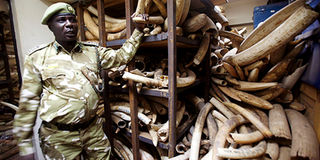Kenya wins the first round on ivory

A Kenya Wildlife Services ranger shows elephant tusks intercepted from poachers. Zambia and Tanzania wanted a one-off sale of 112 tonnes of ivory but the 23-member countries of the African Elephants Coalition, led by Kenya and Mali, opposed the request, saying it would spur poaching. Photo/FILE
Elephants were thrown a life line on Thursday after it emerged that Tanzania’s proposal to be allowed to sell ivory is likely to be rejected.
The rejection by conservation agency, Convention on International Trade in Endangered Species (Cites), would be a major victory for the Kenyan elephant, which is facing increasing danger from poachers. Elephants move freely between the Kenyan and Tanzanian game parks along the common border.
The Cites secretariat recommended that Tanzania’s proposal to sell nearly 90 tonnes of stockpiled ivory be turned down. However, Zambia will be allowed to sell its stocks because it has better methods of control poaching, Cites said at their talks in Doha, Qatar.
The recommendation is not final and a decision will be taken by delegates who are gearing to begin debate on the Tanzanian proposal.
Zambia and Tanzania last November asked the Cites secretariat to remove the African elephant from the list of animals facing extinction.
This would mean that trade in ivory was not banned but controlled. The two countries wanted a one-off sale of 112 tonnes of ivory. But the 23-member countries of the African Elephants Coalition, led by Kenya and Mali, opposed the request, saying it would spur poaching.
International Fund for Animal Welfare Southern Africa director Jason Bell-Leask said elephant populations had declined in the past 30 years and were still recovering from the poaching of the 1980s. At the last Cites conference in 2007, a nine-year moratorium on trade in ivory was agreed upon.
“Corruption, the loss of more than 30,000 elephants in three years, all justify rejection of the Tanzania proposal,” Ms Shelley Waterland, the chairperson of the Species Survival Network’s Elephant Working Group, said on Thursday.
Technology
At the same time, Cites is urging governments to incorporate the internet and new information and communication technology in protecting fauna and flora. Kenya Wildlife Service runs the Wildlife Anti-Poaching Unit, established by the government with support from the World Bank, the United States, and the European Union. The unit has 19 aircraft, a modern communication system, and 24-hour monitoring teams.




